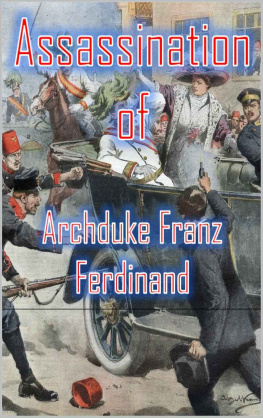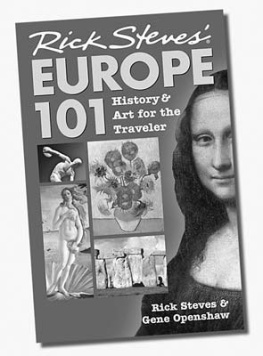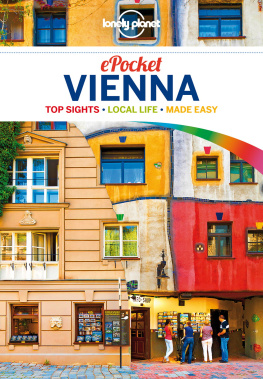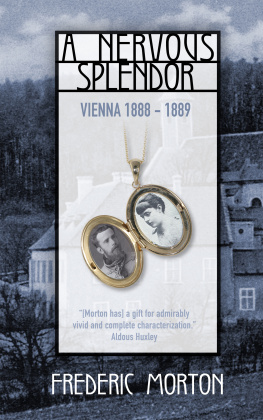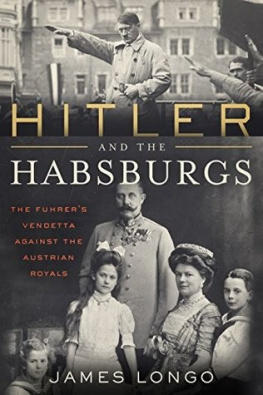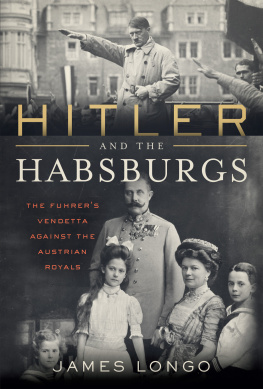
PREVIOUS BOOKS BY FREDERIC MORTON
FICTION
The Hound
The Darkness Below
Asphalt and Desire
The Witching Ship
The Schatten Affair
Snow Gods
An Unknown Woman
The Forever Street
NONFICTION
The Rothschilds
A Nervous Splendor: Vienna 1888/1889
Crosstown Sabbath: A Street Journey Through History

Copyright 1989, 2001, 2014 by Frederic Morton
All rights reserved. No part of this publication may be reproduced, stored in a retrieval system, or transmitted, in any form or by any means, electronic, mechanical, photocopying, recording, or otherwise, without the prior written permission of the publisher. For information, address Da Capo Press, 44 Farnsworth Street, 3rd Floor, Boston, MA 02210.
The James Joyce quote in the epigraph is from James Joyce by Herbert Gorman (New York: Rinehart & Co., 1938).
Cataloging-in-Publication data for this book is available from the Library of Congress.
First Da Capo Press paperback edition 2001
Second Da Capo Press paperback edition 2014
ISBN 978-0-306-82327-5 (e-book)
Published by Da Capo Press
A Member of the Perseus Books Group
www.dacapopress.com
Da Capo Press books are available at special discounts for bulk purchases in the U.S. by corporations, institutions, and other organizations. For more information, please contact the Special Markets Department at the Perseus Books Group, 2300 Chestnut Street, Suite 200, Philadelphia, PA 19103, or call (800) 810-4145, ext. 5000, or e-mail .
10 9 8 7 6 5 4 3 2 1
TO M. C. M.
TO MY TWO DEAREST VIENNESE:
MY PARENTS, FRANK AND ROSE MORTON
AND TO ELISABETH AND LESTER COLEMAN, FOR SO MUCH
CONTENTS
IN JULY 1916, FRITZ MANDELBAUM, A JUNIOR OFFICER IN AUSTRIAS Seventh Army on the Russian front, near the river Dnjestr, was shot in the abdomen and died shortly thereafter. Twenty-four years later the name suffered erasure again. This time it was borne by a refugee boy arriving in New York in 1940. His father changed the familys name. Fritz Mandelbaum became Frederic Morton.
In a way this book is a memorial to the first Fritz Mandelbaummy uncleand to the more than ten million who died with him in the Great War. But since much of this book is set in Vienna, it is also an exploration of history backstage. The baroque died in Vienna with flamboyant afterquivers while at the same time some peculiar force here generated energies that would shake the new century. Here were streets uniquely charged with both nostalgia and prophecy. Three of my recent books have tried to penetrate the phenomenon.
My novel The Forever Street centered on a family of Jewish manufacturers in Austria, from fin de sicle to Anschluss; it is based on the real-life Mandelbaum factory whose machines stamped out Habsburg military decorations, then political badges for the successor republic; then, suddenly and just as smoothly, Wehrmacht medals after the Nazis took it over in 1938.
My nonfiction work A Nervous Splendor: Vienna 1888/1889 is an account of the months before and after the suicide of Crown Prince Rudolf. The story ends on the Saturday of the Easter weekend of 1889, when Rudolfs sarcophagus was consecrated at the hour of Adolf Hitlers birth.
The present book deals with the events, ideas, unpredictabilities and inevitabilities surrounding the death of the next Crown Prince, Archduke Franz Ferdinand. The bullet that tore into his jugular sounded the initial shot in the most devastating slaughter mankind had known so far. It set off the dynamics leading to World War II. In other words, it galvanized a Zeitgeist whose consequences live today in the international news, on the street corner, in encounter sessions, on the canvases of Soho galleries. Many of the threads of the scene all around us were first spun along the Danube in the year and a half preceding the thrust of that pistol at the Archdukes head.
Imperial Austria has become a byword for melodious decay. It also stokedcruciallythe ferment that is the idiom of modernity. Why did that happen just then and just there? And how? In what twists of the labyrinth did the world of the first Fritz Mandelbaum fragment into the world of the second? Is there a pattern to the maze? The pages that follow attempt an answer.
F.M.
I cannot begin to tell you the flavor of the Austro-Hungarian Empire. It was a ramshackle affair but it was charming, gay and I experienced more kindness [here].... than ever before or since in my life. Times past cant return, but I wish they were back.
JAMES JOYCE, TO A FRIEND
And when we were children, staying at the arch-dukes,
My cousins, he took me out on a sled,
And I was frightened. He said, Marie,
Marie, hold on tight. And down we went.
T. S. ELIOT, The Waste Land

ON THE EVENING OF JANUARY 13, 1913, VIENNAS BANK EMPLOYEES Club gave a Bankruptcy Ball. It was the height of pre-Lenten carnivalin mid-winter at its meanest. Ice floes shivered down the Danube, galas sparkled inside baroque portals, and the bankruptcy gambol really warmed the Viennese imagination.
A number of ladies appeared as balance sheets, displaying voluptuous debits curving from slender credits. Others came as collateral. Their assets, ready to be garnisheed, were accented sometimes with a dcolletage, sometimes with a bustle. Thin men were costumed as deposits, fat men as withdrawals. Sooner or later everybody ended up at Debtors Prisonthe restaurant of the Blumensaal where the festivity was held. Here mortgage certificates served as doilies for Sachertortes. Ornamented with the bailiffs seal, eviction notices made colorful centerpieces; each was topped by a bowl of whipped cream. If you wrote your waiter an I.O.U., he would pour you a goblet of champagne.
The merriment increased steadily until 5 A.M. when the orchestra leader stopped his men, suddenly, in the middle of the Emperor Waltz. To great laughter he announced that since the musicians still hadnt been paid, there would be no more music.
The next day parliament voted on the flotation of a bond issue; its proceeds would subsidize the installation of plumbing into apartments that had none. In working class districts like Hernals and Favoriten most families must use outside toilets and corridor sinks. The bill was killed. Such news would anger the toiling poor when they read about it later. It did not affect their carnival routine. Many trudged to work with their ball clothes in a paper bag. Changing at home would have meant an extra streetcar ride beyond their means. Therefore they went directly from wee-hours waltz to morning shift. Before the lunch bell sounded, soot had grayed the confetti in their hair.
That week glacial winds punished the streets. Butrare for Vienna in the winterthe sun shone. In the center of town the Ringstrasse, a palatial wreath of a boulevard, glowed like a mirage. The snow capping its hundreds of rooftop statues looked more marmoreal than the imitation marble of the figures. During carnival everything Viennese seemed to revel in being what it was not.
On the night of January 18, for example, Prince Auersperg gave a Bucolic Lark at his palais. The Duke of Teck made an entrance in the homespun of a shepherd. Prince zu Windischgrtz honed his sickle with a weariness as peasant-y as his leather-shorts. Princess Festetics and Countess Potocka, milkmaids, in dirndls authentic down to the grease stains on their bodices, swung pails.
Next page


